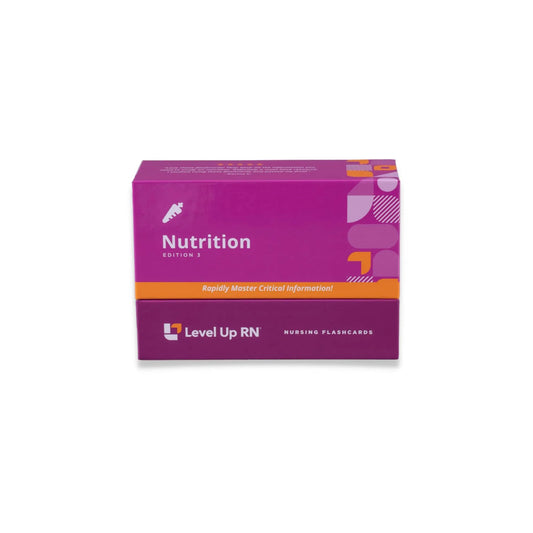When you see this Cool Chicken, that indicates one of Cathy's silly mnemonics to help you remember. The Cool Chicken hints in these articles are just a taste of what's available across our Level Up RN Flashcards for nursing students!
Why do water soluble vitamins need to be replenished more often? What conditions can be caused by deficiencies in the different B vitamins? Which one is Riboflavin? Why did pirates get scurvy? We'll answer all of this and more in this overview on water-soluble vitamins (B-complex vitamins and vitamin C). This series follows along with our Nutrition Essentials for Nursing Flashcards which are intended to help RN and PN nursing students study for nursing school exams, including the ATI, HESI, and NCLEX.
Nutrition plays a key role in patient wellness, and patient teaching regarding nutrition is a key part of EVERY nurse’s job. These flashcards will help you understand the basics of nutrition, along with key nutritional and lifestyle considerations for common health disorders.
What are water-soluble vitamins?
Water-soluble vitamins are vitamins that can dissolve in water. Water-soluble vitamins are carried to the body's tissues and organs but are not stored in the body long-term, like fat-soluble vitamins are. Vitamin C and B-complex vitamins are the water soluble vitamins you will need to know about.
Water-soluble vitamins cycle through the body quickly and need to be replenished daily through diet or supplementation. Because of this, they carry a lower risk for toxicity than do fat-soluble vitamins.
Nutrition Essentials - Nursing Flashcards
B-Complex Vitamins
B-complex vitamins (B1, B2, B3, B5, B6, B7, B9 and B12) serve important functions in the body, including biochemical reactions, body growth and development, healthy skin, metabolism, heart and nerve function, and red blood cell formation.
In general, people are at low risk for toxicity related to B-complex vitamins because they are water-soluble, leave the body very quickly, and require regular replenishment through diet.
What are the B-complex Vitamins?
There are eight B-complex vitamins.
- Thiamin (B1)
- Riboflavin (B2)
- Niacin (B3)
- Pantothenic acid (B5)
- Pyridoxine (B6)
- Biotin (B7)
- Folate/Folic Acid (B9)
- Cobalamin (B12)
Sources
B-complex vitamins can be found in meat, fish, poultry, eggs, dairy products, leafy green vegetables, beans, peas, and fortified cereals and bread.
B-complex vitamin supplements
Manufactured folic acid is used as an antianemic agent and to prevent neural tube defects.
Cyanocobalamin (manufactured B12) is used to prevent and treat pernicious anemia and is administered intranasally.
These are some of the many important medications covered in our Pharmacology Flashcards for Nursing Students.
Risk factors for B-Complex vitamin deficiency
Risk factors for deficiency in B-complex vitamins include alcohol use disorder, malnourishment, malabsorption syndromes (like short bowel syndrome), and bariatric surgery.
B-Complex Vitamin Deficiencies
B-Complex vitamin deficiencies can lead to specific problems in the body, depending on which B vitamin it is. It is more likely that you will be tested on these specific deficiencies than the specific functions of each vitamin. So in this section, we'll explain the deficiencies that can be seen with vitamins B1, B2, B3, B6, B9 and B12.
Thiamin (B1)
Deficiency in vitamin B1 can lead to Wernicke-Korsakoff syndrome (degenerative brain disorder), and beriberi. Beriberi affects the cardio and neurovascular systems, leading to increased heart rate and peripheral neuropathy.
Riboflavin (B2)
Deficiency in vitamin B2 can lead to cheilosis, which is a condition of dry swollen lips and fissures (cracks) at the corners of the mouth.
Niacin (B3)
Deficiency in vitamin B3 can lead to pellagra, which is a systemic disease that can result in diarrhea, dermatitis, and dementia. The FDA requires enriched bread products to be fortified with niacin.
 3Ds: Diarrhea, Dermatitis, Dementia.
3Ds: Diarrhea, Dermatitis, Dementia.
Pyridoxine (B6)
Deficiency in vitamin B6 can lead to peripheral neuropathy and anemia.
Folate/Folic Acid (B9)
Deficiency in vitamin B9 can lead to fetal neural tube defects, which can cause fetal spine or brain defects.
Very often patients who are pregnant, or considering getting pregnant, will be put on a folic acid supplement because it prevents these birth defects.
As a public health measure, In 1998, the U.S. Food and Drug Administration required that folic acid be added to enriched grain products (such as bread, pasta, rice, and cereal). This is called fortification.
Cobalamin (B12)
Pernicious anemia is known as vitamin B12 anemia. A protein called intrinsic factor binds B12 so that it can be absorbed. If the gastric mucosa doesn't produce enough intrinsic factor, then the B12 can't be absorbed.
When someone has pernicious anemia due to a lack of intrinsic factor, they need B12, but can't be given it orally because they can't absorb it. A patient with pernicious anemia would need to be administered B12 intranasally.
Vitamin C
Vitamin C is an antioxidant that supports collagen growth, bone formation, wound healing, iron absorption, and immune function. Vitamin C is also called ascorbic acid.
Sources
Vitamin C can be found in citrus fruits (like oranges or grapefruits), tomatoes, potatoes, red or green peppers, broccoli, kiwi, and strawberries.
Vitamin C deficiency
A deficiency in vitamin C can cause the disease scurvy. You've probably heard of scurvy in the context of pirates—historically many sailors (pirates and otherwise) died of scurvy because they did not have access to fresh fruits and vegetables, or adequate nutrition overall, aboard ships.
 The letter C is Curvy (to remind you of sCurvy).
The letter C is Curvy (to remind you of sCurvy).
Risk Factors
Risk factors associated with scurvy include smoking, poor nutrition, and alcohol use disorder.
Signs and Symptoms
Signs and symptoms associated with scurvy are swollen and bleeding gums, tooth loss, and poor wound healing.



1 comment
Thanks is very good work you have to do 🙏